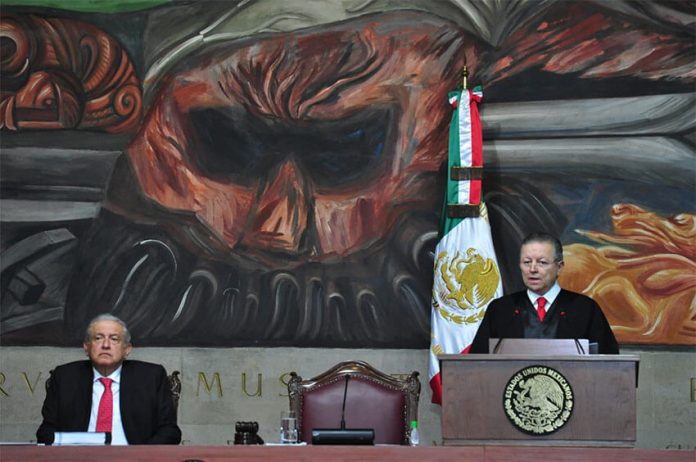There is no longer institutionalized corruption or nepotism in the federal judiciary, Supreme Court Chief Justice Arturo Zaldívar declared Wednesday.
Delivering his third annual report as head of the federal judicial power, Zaldívar said that corruption is no longer tolerated and that only “isolated” cases remain.
There have have been countless cases over the years in which judges have taken or allegedly taken bribes in exchange for favorable rulings. Some judges have been found to have ties to powerful criminal organizations such as the Jalisco New Generation Cartel.
Zaldívar acknowledged that he has previously spoken about shady dealings between judges and suspected criminals.
“A few years ago at this very place I said that the federal judicial power faced a significant corruption problem. I annoyed a lot of people when I said it and the assertion still makes people uncomfortable today. But when it comes to public institutions, which belong to the people, dirty laundry isn’t aired at home,” he said.
“… [Now] I can categorically declare that there is no longer tolerated or institutionalized corruption in the federal judicial power. There is no longer corruption endorsed or sponsored from above. The cases of corruption that exist are isolated and are no longer due to the existence of mafias of corruption that used to operate from within. A change of behavior has been generated because there are no longer [judicial] leaders who protect corruption schemes,” Zaldívar said.
Speaking to an audience that included his Supreme Court colleagues, President López Obrador, members of the federal cabinet and lawmakers, the chief justice said the only way to overcome problems such as corruption is through self-criticism.
“Acknowledging our problems is a duty of justice for those who have suffered corruption and for the vast majority of public servants who are honest and honorable,” said Zaldívar, who is considered an ally of the president, although the two men have clashed.
He said that nepotism within the judiciary was a common practice for years.
“For a long time the opportunities to enter and be promoted in the federal judicial power didn’t depend on merit. There was a generalized practice in which the heads of jurisdictional bodies gave appointments to family members, … which generated significant inequality for access [to positions] and promotion as well as conflicts of interest and influence peddling,” Zaldívar said.
“With … the implementation of the Comprehensive Plan to Combat Nepotism, we’ve put an end to this phenomenon. Today there are clear rules that govern hiring and which prevent situations of conflicts of interest and influence peddling. Thanks to the application of these rules we’ve eradicated nepotism in all jurisdictional bodies,” he said.
“… Today we’re a new judicial power that provides justice that is more humane and effective … than ever,” Zaldívar affirmed.
“… The people of Mexico are crying out for justice that has historically been denied … [because the judiciary] has always been at the service of power and privilege. The changes we’ve achieved will begin to be felt soon. The people will know they have federal judges who will defend them and make their demands for justice a reality.”
The federal government has sought to do its bit to clean up the judiciary, passing reforms designed to eliminate corruption, nepotism and harassment in the court system.
López Obrador attempted to extend Zaldívar’s term as chief justice by two years, arguing that only he is capable of implementing the government’s laws to overhaul the judicial system. The Congress approved the initiative, but the Supreme Court revoked the law last month, ruling that it was unconstitutional.
With reports from Milenio
